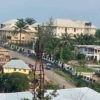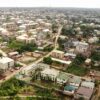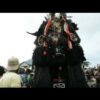African History
Isuochi Ancient Kingdom || The Land; The People; The Culture
Isuochi is a historic Igbo town in Umunneochi, Abia State known for its rich culture, lively festivals, craftsmen and natural attractions like Ngodo cave and waterfalls. Learn about Isuochi: its history, villages, leadership, economy, markets, beliefs, dishes, notable people, landmarks, challenges, and hopeful outlook.
Isuochi Agrarian Side
Isuochi is one of those remarkable Igbo towns whose story reflects both tradition and transformation. Nestled in Umunneochi Local Government Area of Abia State, southeastern Nigeria, Isuochi stands as a living link between the old and the new, where ancient customs meet modern aspirations.
The town is blessed with scenic hills, fertile farmlands, skilled craftsmen and warm, community-minded people. Its deep-rooted values of hard work, hospitality and unity continue to define the daily lives of its people, even as the younger generation reaches out to the wider world.
To speak of Isuochi is to speak of a people with a proud past and a hopeful future. From its founding legends tracing back to the ancestral figure Ochi, to its thriving network of villages and markets, its social and cultural life remains vibrant and deeply communal. The town is also home to fascinating natural landmarks such as the Ngodo Cave and Waterfall, places that tell the story of both history and the beauty of nature.
Today, this ancient town is more than a geographical location. It is an identity shaped by resilience and shared heritage. Its traditional leadership systems coexist with active town unions and diaspora associations that drive development projects back home.
The sound of drums during festivals, the colourful dance of masquerades and the everyday rhythm of farming, trading and craftsmanship all echo the enduring spirit of the people.
This article explores Isuochi in depth: the land, people, economy, culture and contemporary life. It provides a balanced and factual picture of a town that continues to grow while holding firmly to the roots that make it unique.
A Brief History of Isuochi
Isuochi Ancient Kingdom
The history of Isuochi is intertwined with oral tradition, community memory and the migration patterns of Igbo-speaking peoples. Located in what is now Umunneochi Local Government Area of Abia State, Nigeria, Isuochi traces its ancestry to a forebear known as Ochi. According to community sources, Ochi was a warrior and wrestler who, seeking a healthy, stone-less, wind-swept environment suitable for settlement and sport, moved and established himself at Nkwoagu which is regarded as the heart of the community.
Ochi had a son named Isu from whom the name “Isuochi” is derived. Isu in turn fathered two sons: Ezi and Ihite. Ezi Isuochi included five villages: Umuelem, Achara, Lomara, Amuda and Umuaku. Ihite Isuochi included another four villages: Ndiawa, Ihie, Mbala, and Ngodo.
By 1970, the community adopted a shared system of civic cooperation and resource distribution among the nine villages, including protocols for kola-nut presentation and communal order.
Administratively, Isuochi is part of Umunneochi LGA, and until 1991, was under the old Imo State before the creation of Abia State on 27 August 1991
In more recent history, the traditional leadership of the town was formalized. In 1974, Eze Godwin Irononso Ezekwesiri became the first paramount ruler (Ochi I) of the Isuochi Ancient Kingdom, reigning for 51 years until his passing at age 88. His reign is widely reported as a period of stability and cultural consolidation for the town.
Over the decades, Isuochi has maintained its social and cultural cohesion while engaging with regional development, agriculture, quarrying and migration. Local scholars note that the community is known for both its artisan tradition and social organization.
Thus, the history of this ancient town is one of ancestral lineage, village formation, communal agreement and modern integration within the wider state structure, all contributing to the identity of the town today.
Location and Geography
Isuochi is located in the northwestern part of Abia State within Umunneochi Local Government Area in southeastern Nigeria. It lies along the boundary between Abia and Anambra States, making it a strategic gateway town that connects the southeastern and south-central regions of the country.
The community is bordered by Awgu in Enugu State to the north, Okigwe in Imo State to the west, and Lokpanta and other parts of Umunneochi to the south and east. This position has historically made the town an important link for trade, travel and cultural exchange among neighbouring Igbo communities.
Geographically, Isuochi is marked by a mix of rolling hills, valleys and plains. The terrain rises gently in several parts, giving the town a scenic and airy landscape. Its soil is mostly sandy-loam, suitable for a range of agricultural activities including cassava, yam and oil palm cultivation. The climate follows the typical tropical pattern found in southeastern Nigeria characterized by two distinct seasons, namely, a wet season that runs roughly from April to October and a dry season from November to March.
The area enjoys moderate rainfall and good sunlight, supporting both subsistence and commercial farming. Several natural water sources such as streams, springs and small rivers locally known as iyi serve the villages and also support irrigation and domestic use. The vegetation is largely secondary forest interspersed with farmland, fruit trees and patches of bamboo and palm groves.
The natural environment of the town also features notable landforms such as the Ngodo Cave and Waterfall, a geological and tourist site that draws visitors and researchers interested in rock formations and natural heritage. Other parts of the community contain smaller caves, hilltops and green belts that reflect the area’s undulating topography.
Its location along the Enugu–Okigwe–Umuahia route and proximity to major highways enhances access to nearby urban centers like Enugu, Okigwe and Umuahia. This geographic advantage supports trade and communication while allowing the town to maintain its serene, semi-rural charm.
Put simply, Isuochi’s geography which is a blend of fertile land, mild hills and rich natural scenery has shaped both its economy and way of life. It remains a community where nature, culture and livelihood coexist in balance.
Villages and Communities that Make Up Isuochi

Isuochi People
Isuochi is a federation of closely related villages bound by shared ancestry, customs and social ties. Historically, the town traces its lineage to a common forefather, Ochi whose descendants spread out to form the present-day village clusters. These settlements together make up what is today known as the Isuochi Ancient Kingdom in Umunneochi Local Government Area of Abia State.
Traditionally, this ancient kingdom is divided into nine main villages grouped under two ancestral lineages – Ezi Isuochi and Ihite Isuochi. This structure reflects the town’s origin story and still defines its social and cultural organization.
Ezi Isuochi comprises the following villages:
- Umuelem: Known for its strong communal leadership and role in hosting major town meetings.
- Achara: A vibrant farming and trading community recognized for its open markets and active youth groups.
- Lomara: Noted for its craftsmanship, palm produce and active participation in town union activities.
- Amuda: Home to many traditional institutions and family shrines, preserving Isuochi cultural rites.
- Umuaku: Known for its fertile lands and contribution to town’s agricultural production.
Ihite Isuochi comprises:
6. Ndiawa: Renowned for its hospitality and traditional festivals.
7. Ihie: A close-knit community with strong emphasis on cultural preservation and education.
8. Mbala: Known for its artisans and potters, contributing to Isuochi traditional art and crafts heritage.
9. Ngodo: Famous for its scenic cave and waterfall, a notable natural landmark and tourist attraction in Abia State.
Each of these villages maintains its local leadership headed by elders and community representatives who work collectively under the umbrella of the Isuochi traditional council. The council serves as a unifying body for all the villages, coordinating cultural festivals, communal projects and conflict resolution.
While the nine villages operate independently in certain local matters, they share common customs, festivals and a deep sense of brotherhood. Marriages, markets and social events often cut across village boundaries, reinforcing the unity of the people.
Over time, population growth and modernization have led to the development of sub-communities and quarters within these villages. However, the original nine remain the recognized ancestral units that define Isuochi traditional and administrative identity.
Together, these villages embody the spirit of cooperation, unity and cultural pride that continues to make Isuochi a cohesive and forward-looking community in Abia State.
Leadership and Traditional Authority
Leadership in Isuochi reflects the deeply rooted Igbo philosophy of collective wisdom, respect for elders and structured traditional governance. Like many Igbo communities, the town combines traditional authority with modern administrative systems to maintain order, unity and progress.
Historically, the traditional system of the town revolved around the authority of family heads, village elders and titled men who were responsible for moral guidance, dispute resolution and cultural preservation. Over time, as the community expanded and modernization set in, these structures evolved into a more centralized kingship system to ensure cohesive leadership across all nine villages.
The modern institution of kingship in Isuochi dates back to the 1970s when the community established the Isuochi Ancient Kingdom as a single traditional entity. In 1974, His Royal Majesty, Eze (Dr.) Godwin Irononso Ezekwesiri was crowned the Ochi I of Isuochi, becoming the town’s first recognized traditional ruler under the Abia State Council of Traditional Rulers.
Eze Ezekwesiri’s reign which lasted for over five decades was marked by peace, unity and development. He was widely respected for his diplomatic skill in managing inter-village relations and promoting education, culture and community development. He passed on in 2024 at the age of 88, leaving behind a strong legacy of service and cultural stewardship.
The Eze-in-Council, made up of chiefs, village representatives and community elders assists the traditional ruler in decision-making. Each of the nine villages has its own council of elders who oversee village-level affairs, enforce customary laws and ensure that traditional values are passed from one generation to the next.
Complementing the traditional structure is the Isuochi Development Union (IDU) – a unifying town union that represents the interests of the town both at home and in the diaspora. The IDU works closely with the traditional council to address social, economic and infrastructural challenges. Similarly, diaspora associations such as the Isuochi Progressive Union (IPU-USA) play vital roles in supporting local projects, education and healthcare initiatives.
This blend of traditional leadership and modern organization has helped the town to maintain harmony, even as the community adapts to changing times. The system ensures that while government policies and development programmes reach the town, the voice of tradition remains strong.
In essence, leadership in Isuochi is not just about authority, it is about stewardship, service and the preservation of identity. The traditional ruler remains the symbol of unity while the councils and unions serve as the lifeblood of communal governance, ensuring that the values of integrity, cooperation and respect continue to define their collective spirit.
Economy and Resources
The economy of Isuochi is shaped by a blend of traditional livelihoods and emerging modern enterprises. Like most Igbo communities, the people are industrious and resourceful. They combine farming, trading, craftsmanship and small-scale industries to sustain their families and contribute to community growth.
Farming remains the backbone of its local economy. Isuochi fertile soil and favourable climate make it ideal for the cultivation of staple crops such as yam, cassava, cocoyam, maize and vegetables. Oil palm and cashew are also widely grown, providing both food and income for many households. These crops are often sold in local markets or transported to nearby urban centres such as Okigwe, Enugu and Umuahia.
Livestock farming, especially goats, poultry, and pigs supplements crop production and provides additional income for families. Seasonal farming activities not only support livelihoods but also reinforce communal cooperation, as neighbours often come together for bush clearing, planting and harvesting.
Trade plays a major role in the economy of Isuochi. The town has a number of thriving periodic markets where agricultural produce, livestock and household goods are bought and sold. Many residents are also involved in petty trading, transportation services and small-scale retail. The strategic location of the town bordering Enugu and Imo States and lying along the Enugu–Okigwe–Umuahia route has boosted its position as a local trading hub.
Several markets in the town serve as commercial centres for both locals and visitors, with goods ranging from farm produce and palm oil to textiles and building materials. The trading spirit of the people is evident in the increasing number of shops, motor parks and small business outlets springing up along the major roads within the town.
Isuochi is known for its strong artisan culture. Local craftsmen such as masons, blacksmiths, carpenters and potters are well regarded within and beyond the town. Traditional arts and crafts, including pottery, weaving and wood carving remain part of the community’s cultural heritage. A research study on “The Isuochi Artisans” highlights the potential of these traditional skills as drivers for tourism and local economic development, when properly supported and promoted.
The Umunneochi area, including Isuochi is rich in mineral deposits such as granite, limestone and laterite. Quarrying and small-scale mining activities provide employment and revenue, but also raise environmental concerns. Many residents depend on quarry-related jobs or supply services while community leaders continue to advocate for environmentally responsible mining practices and fair compensation for affected areas.
Remittances from Isuochi people living in Nigerian cities and abroad are a major economic support system. Diaspora groups, especially the Isuochi Progressive Union (IPU-USA) frequently fund local projects in education, health and infrastructure. This strong connection between home and abroad helps bridge development gaps and supports small-scale entrepreneurship at the grassroots.
In recent years, more youths have ventured into transport services, hospitality, ICT and education-related businesses, reflecting gradual diversification from purely agricultural livelihoods. With better infrastructure and investment, the community has the potential to become a centre for agro-processing, craft-based tourism and small manufacturing within the region.
Essentially, the economy of Isuochi rests on three pillars, namely, farming, trade and craftsmanship supported by natural resources and diaspora investments. The hardworking spirit of the people, coupled with their adaptability ensures that even amid modern economic pressures, the town continues to sustain itself through innovation, cooperation and a deep respect for the land that feeds its people.
Major Markets
Markets have always been at the heart of social and economic life in Isuochi. They are not just centres of trade but also places of interaction, news exchange and cultural connection. Each market day draws farmers, traders, artisans and visitors from within and outside the community, creating a vibrant atmosphere that reflects the industrious spirit of Isuochi people.
One of the markets in Isuochi is Nkwoagu Market. Located in Amuda Isuochi, Nkowagu is the largest and most popular market in the area. It operates mainly on the traditional Nkwo market day, following the Igbo four-day calendar. Traders from neighbouring towns such as Okigwe, Uturu and parts of Enugu State come to buy and sell farm produce, livestock, clothing and household items. The market has grown from a small village square trade point into a major regional hub with modern stalls, shops, and transport connections.
Afor Isuochi is another key market located near the boundary communities of Umuaku and Lomara. It serves as a distribution centre for palm produce, cassava and other farm products. On Afor market days, the area comes alive with commercial activity as farmers display their goods and traders from nearby villages bring in wares ranging from tools to fabrics. The market is also an important social spot where people meet friends, discuss community matters and relax after trading.
Orie Ngodo Market in Ngodo Isuochi caters primarily to local daily needs and agricultural exchange. It is smaller than Nkwoagu but deeply significant to the local economy. The market is known for its variety of fresh produce – vegetables, fruits, and tubers, and serves as a source of livelihood for women traders. Many households depend on this market for affordable food and everyday goods.
Eke Umuelem is one of the oldest community markets in the town. Though not as large as Nkwoagu, it retains its traditional character and importance. It attracts both local and itinerant traders, offering an assortment of palm oil, yams, goat meat and local spices. The Eke market day remains a cultural reminder of the people’s ancestral trade system, and elders often gather there for informal discussions and traditional drinks after business hours.
Beyond these periodic markets, Isuochi is also home to a growing number of daily retail shops, provision stores and motor parks that facilitate commerce throughout the week. Modern stalls and mini-markets have sprung up along the Okigwe–Umunneochi–Enugu highway, offering convenient access for travellers and residents alike. These new trading spots reflect the town’s gradual shift toward a more urbanized economy while preserving its traditional trading identity.
Altogether, the major markets, namely, Nkwoagu, Afor Isuochi, Orie Ngodo and Eke Umuelem form the backbone of local trade and community interaction. They showcase the town’s entrepreneurial drive, support its agrarian economy and sustain the cultural rhythm that continues to define everyday life in Isuochi.
Deities, Totems, Traditional Beliefs, and Religion
Before the advent of Christianity, the people of Isuochi, like many Igbo communities practiced a traditional religion centered on reverence for Chukwu (God), ancestral spirits and local deities believed to protect families and villages. Shrines and sacred groves once served as places of prayer, sacrifice and settlement of disputes.
Among the notable deities once worshipped in different parts of Isuochi were Ala (the earth goddess, symbolizing morality and fertility), Amadioha (the god of thunder and justice), and smaller community spirits believed to guard streams, farmlands and family lineages. Certain animals, trees or rivers were regarded as sacred in some villages and were not to be harmed. These served as local totems, symbolizing protection and identity.
With the spread of Christianity in the early 20th century through missionary activities in nearby towns like Okigwe and Uturu, most traditional practices gradually gave way to modern religious life. Today, Christianity, particularly Catholicism, Anglicanism and Pentecostal denominations dominate the religious landscape of the town. However, traces of the old belief system remain visible during cultural festivals and traditional ceremonies that honour the ancestors or the land.
While Isuochi has embraced modern faith, its people still hold deep respect for their cultural heritage, maintaining a balance between spiritual devotion and ancestral identity.
Festivals and Cultural Life
Festivals in Isuochi reflect the community’s deep sense of tradition, unity and gratitude to God and the ancestors. They serve as moments of celebration, renewal and cultural expression.
The most prominent celebration is the New Yam Festival (Iri Ji Isuochi), held annually between August and September to mark the harvest season. It begins with prayers of thanksgiving, followed by feasting, traditional dances, masquerade displays and visits between families. The festival underscores the people’s strong agricultural roots and communal harmony.
Other notable cultural events include masquerade festivals which feature colourful masks and performances that symbolize ancestral spirits and moral values. These displays, often held during festive periods or communal ceremonies attract both locals and visitors.
Traditional weddings, title-taking ceremonies such as Ozo and Nze, and communal age-grade gatherings also form key parts of Isuochi’s cultural calendar. They serve not only as entertainment but also as a means of preserving identity and strengthening social ties.
Overall, the festivals and cultural life of Isuochi embody pride, continuity and respect for heritage that blends the old and the new in a way that keeps the spirit of the community alive.
Town Unions and Community Organization

IPU-USA
Isuochi has a strong tradition of self-governance and communal development anchored by its town unions and community associations. The central body, the Isuochi Development Union (IDU) coordinates major initiatives affecting the entire town ranging from infrastructure and education to security and welfare.
Each of the constituent villages and communities such as Amuda, Ngodo, Lomara, Umuelem and Umuaku has its own autonomous development union that works in harmony with the IDU. These local unions manage community projects, settle disputes and mobilize members for collective efforts like road maintenance, electrification and school improvement.
In the diaspora, organizations like the Isuochi Progressive Union (IPU) have branches across Nigeria, the United States and Europe. They play vital roles in supporting community initiatives, providing scholarships and funding local infrastructure.
This cooperative structure reflects the unity and industrious spirit of Isuochi people, showing how traditional communal values continue to drive modern development and social progress.
Local Dishes and Cuisine
The cuisine of Isuochi reflects the broader culinary traditions of Igbo people, rooted in natural ingredients and locally sourced produce. Meals are hearty, nutritious and often tied to the seasons of harvest.
The most common staple is pounded yam typically eaten with rich soups such as Ofe Nsala, Ofe Oha, Ofe Onugbu and Ofe Oha. These soups are made with local ingredients like cocoyam, palm oil, ogiri, assorted meats and fish.
Fufu and garri (eba) are also widely eaten, often paired with a variety of soups. During festivals or special occasions, dishes like abacha and ukwa are served to guests.
Other locally cherished delicacies include nkwobi and isi ewu enjoyed in social gatherings and celebrations. Palm wine tapped fresh from raffia or oil palm trees remains the traditional drink of choice that is shared during festivals, weddings and community meetings.
Altogether, the native dishes of Isuochi represent the community’s deep connection to the land, emphasizing freshness, flavour and a strong sense of hospitality.
Prominent Sons and Daughters of Isuochi
Isuochi is blessed with many illustrious sons and daughters who are representing her well in different life endeavours.
Here are some notable individuals from the town whose work has brought recognition to their hometown:
- Uche Chukwumerije (Late): A Nigerian senator who represented Abia North in the Federal Republic of Nigeria. He attended Methodist Central School, Nkwoagu, Isuochi.
- Nkeiruka Onyejeocha: Hails from Isuochi, Umunneochi LGA, Abia State and has served as a member of Nigeria’s House of Representatives, as well as Minister of State for Labour and Employment.
- Eze Godwin Irononso Ezekwesiri (Late): The first traditional ruler (Ochi I) of Isuochi Ancient Kingdom, crowned in 1974 and reigned for 51 years, bringing stability and cultural continuity to the community.
- Maureen Solomon: A Nigerian film actress born in Isuochi, who featured in over 80 Nollywood productions.
- Dr Timothy Chimhurumnaya Ogboruche: A son of Umuelem, Isuochi who commissioned a water and electricity project for his community, demonstrating philanthropic leadership.
These individuals represent different pathways – politics, traditional leadership, entertainment and community development, all tied to the land and people of Isuochi.
Landmarks and Tourist Attractions
Below are some of the landmarks and tourist-attraction sites in and around Isuochi, Abia State, Nigeria:
Ngodo Cave and Waterfall, Ngodo-Isuochi
This is perhaps the most notable natural attraction in Isuochi. The site includes a cave system with both stalactites and stalagmites set amongst a rocky landscape. It is listed among the key tourism sites in Abia State and specifically mentioned under tourism potentials in the Umunneochi Local Government Area.
Visitors to Ngodo Cave and Waterfall can enjoy hiking into the cave, view the rocks and water flows and take photographs in a relatively undeveloped natural environment.
Mmam River and environs in Umunneochi
Although not exclusively within Isuochi town proper, Mmam River is cited in local tourism discussions of the Umunneochi area as a natural site of interest. The river flows near the Isuochi area and is recognized for its scenic environment, mountainous surroundings and potential for relaxation and nature-based tourism.
The site is accessible via a short drive from the Isuochi town union and is often mentioned in connection with community tours of the area’s natural heritage.
Ochi Royal Palace, Umuelem-Isuochi
The palace of the traditional ruler of Isuochi is a cultural landmark. It is located in Umuelem village and serves both as a seat of traditional authority for the community and as a point of interest for visitors who wish to learn about local governance, history and cultural heritage.
Visitors may arrange to visit the palace respectfully and with permission to learn about the town’s traditional leadership, ceremonial customs and local arts.
Other rock caves, hills and natural sites
According to tourism listings for Abia State, the northern axis of the State, including Umunneochi/Isuochi contains a cluster of caves and rock‐hewn landscapes that form part of the region’s natural heritage. For example, the usage and mention of “caves in Umunneochi” as part of the tourism inventory appear in official State tourism-culture releases.
While some of these sites are not yet fully developed for tourism in terms of infrastructure, signage, visitor facilities, they present opportunity for guided visits in a semi-rural setting.
In short, Isuochi offers a blend of natural landmarks (such as the Ngodo Cave & Waterfall and Mmam River environs) and cultural/historical sites (such as the Ochi Royal Palace). These sites are part of the town’s appeal for tourism, education, and heritage-preservation.
With proper development and infrastructure, they hold greater potential to attract visitors and support local community development.
Challenges the Town Faces
Like many growing rural communities in Nigeria, Isuochi faces several developmental challenges. Inadequate road infrastructure, especially in the inner villages affects transportation and trade.
Access to clean water and consistent electricity supply remains uneven across communities.
Unemployment among youths and limited industrial presence have slowed economic growth, pushing many to migrate to cities or abroad.
Environmental concerns such as erosion and the effects of quarrying activities also threaten parts of the landscape.
Healthcare and educational facilities, though improving through community efforts, still require better government support and modern equipment.
Despite these challenges, the people of Isuochi continue to show resilience, relying on unity, hard work and self-help initiatives to drive progress.
Positive Outlook and Opportunities
Notwithstanding its challenges, Isuochi holds strong promise for growth and development. The town’s strategic location which connects it to Abia, Enugu and Imo States positions it as a potential commercial and logistics hub in southeastern Nigeria.
Ongoing road and infrastructure improvements, increased youth interest in education and entrepreneurship and active diaspora involvement point to a bright future. With abundant natural resources, fertile land and a strong culture of self-help, Isuochi is well-placed to attract investments in agriculture, tourism and small-scale manufacturing.
The unity among its people and the commitment of its town unions and leaders continue to strengthen community development.
In all, the resilience, industrious spirit and cultural pride of Isuochi people remain its greatest assets for a sustainable and prosperous future.
In Conclusion…
Isuochi stands today as a proud reflection of Igbo heritage. Deeply rooted in tradition, yet, steadily embracing modern growth. From its rolling hills and fertile farmlands to its vibrant markets, festivals and strong communal bonds, the town tells a story of resilience, unity and progress.
Its people, known for their hard work and enterprising spirit continue to build on the legacy of their forebears through education, innovation and self-help development.
Though challenges such as infrastructure gaps and youth unemployment persist, their spirit of cooperation and active diaspora offer real hope for transformation.
With its natural beauty, rich culture and strategic location, Isuochi holds great potential as both a cultural destination and a centre for sustainable economic growth.
In every sense, Isuochi remains not just a place but a people bound by heritage, faith and the enduring belief that the best is yet to come.
References
- https://en.wikipedia.org/wiki/Isuochi?
- https://www.arcjournals.org/pdfs/ijrth/v6-i1/1.pdf
- https://books.google.com.ng/books/about/The_History_of_Isuochi.html?id=nIAuAQAAIAAJ&redir_esc=y
- https://www.ipuusa.org/
- https://outravelandtour.com/discover-abia-state-top-10-tourist-attractions-you-must-visit/
You might want to check this out…






















